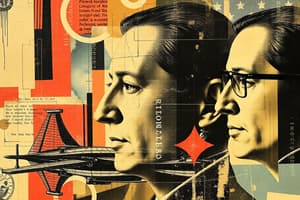Podcast
Questions and Answers
What is the main focus of microeconomics?
What is the main focus of microeconomics?
- The decision-making processes of individual entities (correct)
- The study of global economic trends
- The analysis of government fiscal policies
- The examination of international trade agreements
Which area does microeconomics not typically explore?
Which area does microeconomics not typically explore?
- Global economic indicators (correct)
- Wage determination in labor markets
- Consumer behavior
- Firm decision-making processes
What theory does microeconomics draw upon to explain consumer behavior?
What theory does microeconomics draw upon to explain consumer behavior?
- Theory of Supply
- Theory of Demand (correct)
- Game Theory
- Monetary Policy Theory
In microeconomics, what do firms aim to determine through production theory and cost analysis?
In microeconomics, what do firms aim to determine through production theory and cost analysis?
What aspect of economics does labor economics specifically explore?
What aspect of economics does labor economics specifically explore?
Which branch of economics investigates the impacts of government policies on employment and income distribution?
Which branch of economics investigates the impacts of government policies on employment and income distribution?
What is the primary focus of macroeconomics?
What is the primary focus of macroeconomics?
Which theory is a core element of macroeconomic analysis?
Which theory is a core element of macroeconomic analysis?
What is the primary goal of studying economic growth in macroeconomics?
What is the primary goal of studying economic growth in macroeconomics?
How are microeconomics and macroeconomics interconnected?
How are microeconomics and macroeconomics interconnected?
How does economics help in decision-making according to the text?
How does economics help in decision-making according to the text?
What is the significance of mastering microeconomics and macroeconomics?
What is the significance of mastering microeconomics and macroeconomics?
Study Notes
Unraveling Economics: Micro and Macro Perspectives
Economics, the study of how individuals, businesses, and governments allocate resources, is a vast discipline that sheds light on the complexities of our world. To better grasp this subject, let's delve into two of its main branches: microeconomics and macroeconomics.
Microeconomics: The Scope of Small
Microeconomics, often referred to as the "economics of small things," focuses on the decision-making processes of individual entities such as consumers, firms, and even households. By examining the behavior of these small units, microeconomics aims to understand how they interact to influence overall market outcomes.
A primary goal of microeconomic analysis is to gain insights into consumer behavior, drawing upon the theory of demand to explain how the price and availability of goods and services affect consumer decisions. Microeconomics also investigates the actions of firms, which operate within the boundaries of production theory and cost analysis to determine the optimal level of output and price.
In addition to consumer and firm behavior, microeconomics explores labor economics, which examines the market for labor and wage determination, as well as the impacts of government policies on employment and income distribution.
Macroeconomics: The Scope of Large
In contrast to microeconomics, macroeconomics concentrates on the behavior of aggregate economic variables such as employment, inflation, and economic growth. It endeavors to discover patterns and relationships that exist among these variables and to understand how economies function as a whole.
Macroeconomics is concerned with the overall health and well-being of economies, and it employs a variety of tools and models to analyze the impacts of economic policies on the economy at large. For instance, the theory of aggregate demand and aggregate supply is a core element of macroeconomic analysis, which sheds light on the factors that influence economic output and price levels.
Another important component of macroeconomics is the study of economic growth, which seeks to understand the factors that lead to long-term increases in a country's per capita income. Factors such as capital accumulation, technological progress, and human capital investment play essential roles in the expansion of a nation's economic output.
Interconnectedness: The True Nature of Economics
While microeconomics and macroeconomics often appear as separate and distinct disciplines, they are, in fact, intricately linked. Changes in consumer behavior or firm decisions can have profound impacts on aggregate economic variables, and these shifts can then ripple through the economy.
For example, an increase in household incomes can lead to higher demand for goods and services, which can result in firms increasing production and employment. This, in turn, can lead to increased economic output and inflation. By understanding the interrelationships between microeconomic and macroeconomic variables, we can better comprehend the complexities of our economic world.
The Importance of Understanding Economics
Mastering the concepts of microeconomics and macroeconomics is essential for understanding the inner workings of our world. This knowledge can help us make informed decisions about our personal finances, and it can also provide insights into the impacts and potential consequences of economic policies.
Furthermore, economics provides a framework for evaluating the trade-offs inherent in economic decision-making, and it offers a toolbox for analyzing a wide range of social, political, and environmental issues. By grounding ourselves in the fundamentals of economics, we can better navigate the challenges of our globalized world and work towards a more prosperous future.
In the grand scheme of things, economics is a fascinating subject that sheds light on the many facets of our world. Whether you're interested in understanding consumer behavior, the workings of business, or the intricate dynamics of the global economy, delving into the realm of microeconomics and macroeconomics is an enriching and enlightening endeavor.
Studying That Suits You
Use AI to generate personalized quizzes and flashcards to suit your learning preferences.
Description
Delve into the realms of microeconomics and macroeconomics to grasp the intricacies of individual and aggregate economic behavior. Explore consumer decisions, firm operations, market dynamics, economic growth, and the interconnectedness between micro and macro perspectives.




